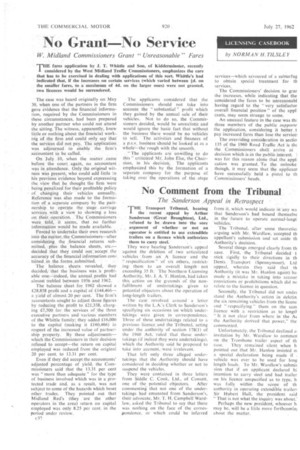• .:NQ GrantNo .Service
Page 72

If you've noticed an error in this article please click here to report it so we can fix it.
W Midland Commissioners Grant "Unreasonable" Fares
THE fares application by I. T. Whittle and Son, of Kidderminster, recently considered by the West Midland Traffic Commissioners, emphasizes the care that has to be exercised in dealing with applications of this sort. Whittle's had indicated that, lithe increases on certain services (which varied between id. on the smaller fares, to a maximum of 4d. on the larger ones) were not granted, two licences would be surrendered.
• The case was heard originally on May 30, when one of the partners in the firm gave evidence that the financial information, required by the Commissioners in these circumstances, had been prepared by another partner who could not attend the sitting. The witness, apparently, knew little or nothing about the financial work . . irig Of the firm and could only say that , the services did not pay. The application was adjourned to enable the firm's accountant to be called.
On July 10, when the matter , came before the court again, no accountant was in attendance. Only the original witness was present, who could add little to his previous evidence beyond expresssing the view that he thought the firm were being penalized for their profitable policy of changing their vehicles annually. Reference was also made to the formation of a separate company by the partnership to operate the stage carriage services with a view to showing a loss on their operation. , The Commissioners were told, it seems, that no further information would be made available.
Forced to undertake their own research into the matter,-the Commissioners—after considering the _financial returns submitted, plus the balance sheets, etc.— decided that they could not .accept the accuracy of the financial information con= tained in the forms _submitted.
The balance sheets revealed, they decided, that the business was 'a profitable one—indeed, the annual profits had almost trebled between 1956 and 1962.
The balance sheet for 1962 showed a £28,858 profit and a capital of £l44,466— a yield of almost 20 per cent The firm's accountants sought to adjust those figures by reducing the profit to £21,358, charging £7,500 for the services of the three executive partners and various members of the Whittle family: they added £16,000 to the capital (making it £160,466) in respect of the increased value of partnership property. By these adjustments— which the Commissioners in their decision refused to accept—the return on capital employed was reduced from the original 20 per cent. to 13.31 per cent.
Even if they did accept the accountants' adjusted percentage of yield, the Commissioners said that the 13.31 per cent was "more than adequate" for the type of business involved which was in a protected trade and, as a result, was not subject to some of the hazards which beset other trades. They pointed out that Midland' Red's (they are the other operators in the area) return on capital employed was only 8.25 per cent, in the period under review.
The applicants considered that the Commissioners should not take into account the " substantial " -profit which they gained by the annual sale of their vehicles. Not to do so, the Commissioners decided, would be unrealistic and would ignore the basic fact that without the business -there would' be no Vehicles to Sell. The activities and finances of
P.s.v. business should be rooked at as a wholethe rough with the smooth.
" The applicants are unwilling to do this' criticized Mr. John Else, the ChairMan, in his decision: The applicants emphasized this by the formation. of a separate. company for the purpose of taking over the operations of the stage
services—which savoured of a subterfug to obtain special treatment for th services.
The Commissioners' decision to grar the increases, while indicating that the considered the fares to be unreasonahl having regard to the "very satisfactor overall financial position" of the appl cants, may seem strange to some.
An unusual feature in the case was du three members of the public supporte the application, considering it better. pay pay increased fares than lose the service: The overriding consideration in sectio 135 of the 1960 Road Traffic Act is tie: the Commissioners shall arrive at decision which is in the public interest. was for this reason alone that the appll cation was granted. To the onlooke though, it may seem that the applicani have successfully held a pistol to th Commissioners' heads.
































































































































